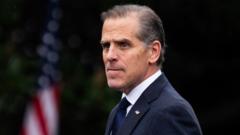With the threat of a 35% tax on Canadian exports to the US looming, Prime Minister Carney emphasizes the importance of a favorable trade agreement, highlighting the adverse impacts of existing US tariffs on Canada's vital industries.
Canada Refuses to Compromise on Trade Deal Amid Looming US Tariffs

Canada Refuses to Compromise on Trade Deal Amid Looming US Tariffs
Prime Minister Mark Carney asserts that Canada will not settle for a detrimental trade agreement with the US, as a critical deadline for tariffs approaches.
Canadian Prime Minister Mark Carney recently underscored that Canada would "not accept a bad deal" in the pursuit of a trade agreement with the United States, as the August 1 deadline approaches before President Donald Trump imposes new tariffs. Carney expressed to reporters in Ontario that, "Our objective is not to reach a deal whatever it costs," emphasizing that negotiations must prioritize the interests of Canadians.
Should negotiations falter, US importers could face a daunting 35% tax on Canadian goods. The relationship between the neighboring countries has become increasingly strained since Trump's return to the presidency, with the introduction of extensive tariffs aimed at bolstering American manufacturing and safeguarding jobs. Critics warn, however, that these tariffs disrupt the global economy and could lead to rising prices for American consumers.
Thus far, Trump has enforced a broad 25% tariff on various Canadian imports, alongside a significant 50% tariff on aluminum and steel goods. In light of this situation, Carney stated that he may consider protective measures for critical Canadian sectors, including aluminum and lumber, as the ramifications of US tariffs begin to unfold. He previously announced countermeasures, such as raising steel tariffs coming into Canada.
Canada's economy heavily depends on its trade with the US, selling approximately 75% of its goods to its southern neighbor. This trade includes substantial exports of oil, automobiles, machinery, food, and pharmaceuticals. According to the Office of the US Trade Representative, the US exported nearly $350 billion in goods to Canada in 2024 while importing over $412 billion from Canada.
Trump has been vocal about his tariff proposals, claiming unfair treatment by international trading partners, and tying some tariffs to efforts to combat the flow of illegal fentanyl into the US. However, data indicates that a mere 0.2% of fentanyl seizures at the US border originate from Canada, with the majority stemming from Mexico.
While Trump has brokered various trade agreements with countries such as the UK, Japan, and Indonesia since initiating a series of tariffs, these deals have retained high tariff rates. Recent agreements, such as a deal with the Philippines, reflect ongoing negotiations under the Trump administration, revealing complexities and challenges in achieving mutually beneficial trade relationships.



















